Chapter 4: Carr’s ‘regeneration’ sowed factional vengeance
4.1 Carr’s leadership ethos
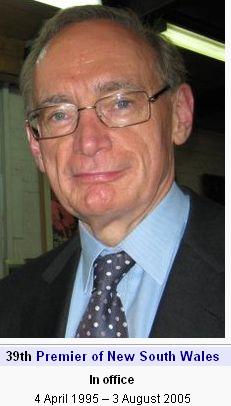
NSW Premier Bob Carr has been described by political lecturer Shelly Savage as ‘urbane, literate or, most commonly, bookish’.1
Eastern Suburbs Sydney born and raised, Carr graduated with honours in History (UNSW), then became a skilled journalist and reporter with a keen focus on politics, before he won the NSW Labor 'Eastern Suburbs' Seat of Maroubra in 1983 at age 36. Aligning himself with Labor Right faction, he was quick to assume ministerial portfolios in Planning, Environment, Consumer Affairs and Heritage before Labor lost power in NSW. Carr aspired to foreign affairs but was pressured by his own Right faction to become Labor Opposition Leader.2 It was however, Carr’s twelve years in the rough and tumble as Opposition Leader that would shape his ten year Premiership from 1995.
A devotee of 19th Century US President Abraham Lincoln, whether coincidentally or otherwise; Carr in some ways emulated Lincoln’s scholarly charisma, his authoritative determined persona, his passion for reading and learning, his power of oratory, and coincidentally his physical likeness.
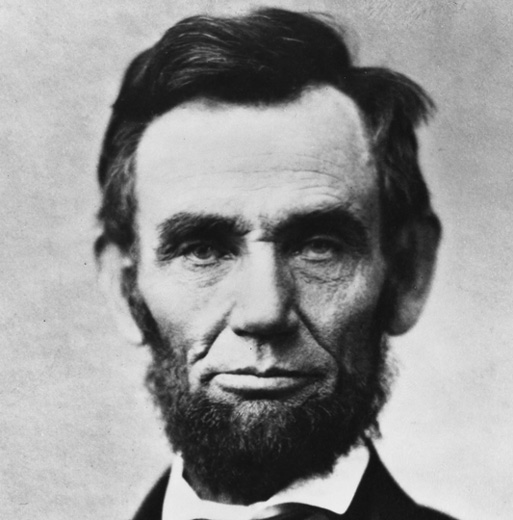
16th US President Abraham Lincoln [1809–1865]
Like Lincoln, Carr conducted himself as a statesman and felt he had a moral contract with the ordinary citizen.
Carr claims he was a ‘reluctant leader’3, originally seeking a career in foreign diplomacy. But career opportunities sometimes are life’s fate, and once he had resolve to lead the NSW Labor Party he managed to remain popular with the electorate for three and a half four year terms and eventually to choose the timing of his departure. In contrast, Lincoln had been a born leader and lived through a tumultuous time of civil war in another era, in another country. Lincoln’ personal and political life became a perpetual struggle against successive failures.4 Lincoln’s ideological commitment to emancipation alienated many. Southerners hated Lincoln for his contribution to the Civil War casualties and ending slavery and many Northerners hated Lincoln for being too soft on the South, and tragically in 1865 Lincoln did not chose is departure.
But where Lincoln had been a visionary reformer, passionately committed to individual human rights and to the principles of democracy, liberty, and equality5; Carr was politically pragmatic, a popularist but hypersensitive to public opinion about his self image and reputation.
Philosophically distinct from Lincoln, Carr believed that politics was never solely about the ‘cause’ or the ‘movement’ understood as an abstract or ultimate value.
According to political analyst Tim Soutphommasane, Carr was not driven by a radical reformist agenda. ‘He was no ideologue in office, nor did he claim to be. ‘Ethos is more important than ideology’; meaning that the ends can justify the means so long as political power is exercised appropriately and consistent with one’s philosophical tradition.6
Soutphommasane suggests that Carr’s leadership ethos was premised on a stoic ethics philosophy, specifically in the tradition of the Meditations of Roman Emperor Marcus Aurelius. It posits accepting and working with nature and life’s events rather than presuming power entitles one to control nature and shape events. Rational thought and detached decision making in the Marcus Aurelius tradition is good a guide to practical politics to avoid the risks of emotive decision making. Adhering to a stoic discipline was for Carr the vital ethos of a wise statesman.
But in the execution of Premiership, Soutphommasane suggests that Carr was inspired by the approaches of NSW former Labor Premiers William McKell (1941–47) and Neville Wran (1976-86) - deliberately one of moderate change management at a pace modelled on ‘gradual reform and compromise’. Hard-line radical reform was rejected as problematic risk-taking attracting unnecessary confrontation, turbulence and bellicosity.7 That both McKell and Wran had in their own ways contributed significantly to environmental conservation for their time, probably also contributed to their historic influence upon Carr.
The well-read Carr learnt from history and from his historic heroes and applied his own unique blended leadership style to his premiership. Trained as a journalist, Carr held a strong personal interest and focus on media communications and so maintained a close connectivity with the ordinary citizen. He recognized the pitfalls of emotive politics and safely adhered to his stoic ethos. Adept at persuasive media oratory he projected a bold Lincoln statesman-like aura, while behind the scenes Carr successfully executed a moderate pace of reform which saw him achieve three straight terms in office.
A main criticism of Carr’s leadership have been that his stoic bookish persona was misread by the media as being aloof, disinterested and even arrogant. Former NSW Auditor, Tony Harris, noted in the lead up to the 2000 Olympics8:
“Thanks to a strong economy and the Olympics, the NSW Opposition is likely to remain irrelevant while Bob Carr is Premier. But his arrogance is beginning to wear thin, even with supporters.”
..and on Carr’s gratuitous performance in Parliament:
“Carr's answer had all the ingredients expected of a politician confident and assured in his position. Indifference served with scorn accompanied by disdain.”
Carr’s compromises were criticised by those with political ideologies from all quarters. Carr’s media pronouncements were repeatedly inconsistent with the Carr Government’s policy and decisions. Carr was harshly criticised for moral relativism and political appeasement of key voter groups. Many of his decisions were made relative to the mood of the people at the time, rather on the basis of a conviction to principle. In other words the ends could justify the means if the means involved pragmatic compromises.
Carr professed his ‘green’ credentials calling for global action to curb greenhouse emissions, yet broke his 'ban on woodchipping' promise by implementing Regional Forest Agreements to permit logging of old-growth forests and refusing to rule out building new coal-fired power stations in NSW. On the latter, Carr had argued:
"It's irresponsible to says that we can close out coal-fired power stations overnight, we can't, the whole state would come to a halt…we are going to explore all the alternatives we've got. That's why we're bringing out a new green paper." 9
But is compromise the task of a political leader and what is the alternative? Professor Mary Kalantzis said in her centenary Barton lecture that Federation was built on peaceful compromise rather than bloody revolution, and on an accommodation between working and former ruling classes.10
Carr was also criticised for his abuse of taxpayer funds to allow his government engage in excessive media propaganda, especially in election campaigns. David Penberthy in The Daily Telegraph in 2000 observed,
"Bob Carr’s media machine is spinning out of control with taxpayers now forking out $1 million a year so the Government can manage the news on transport and law and order."11
4.2 Ministers embarrassing Carr’s leadership
For a populist politician, Carr felt a personal necessity to be popular with the people and to ensure this be reflected in the media. Poor performance and public embarrassments by government departments and by his ministers reflected badly on Carr’s leadership credibility in the media and therefore with the ordinary citizen. This cut into Carr’s core integrity values.
Two years before the March 2003 election, Carr’s Education and Training minister, John Aquilina, in 2001 was accused of making false statements to the media and of political interference in police procedures.

John Aquilina MP
Investigation by the NSW Independent Commission Against Corruption (ICAC) found no evidence of corrupt conduct. Having embarrassed the Carr Government, Aquilina was labelled a ‘poor performer’ and relinquished the portfolio in late 2001. He was down-shifted to the portfolios Land and Water Conservation, and Fair Trading.12
Also in 2001, NSW police had been discovered giving crooks a free run in return for drug money and there was systemic policing problems in the ‘crime crisis’ in the Sydney suburb of Cabramatta. Constant howls of outrage led by Sydney Radio 2GB's Alan Jones damaged the Government's credibility which again embarrassed Carr.13
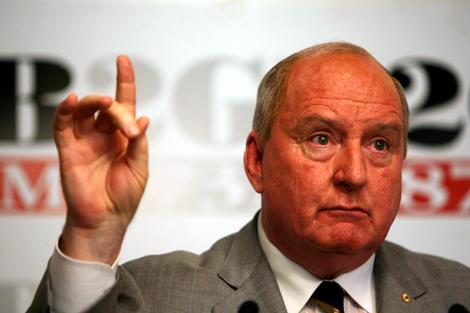
Radio 2GB broadcaster Alan Jones
Jones had become an influential morning radio announcer on the Sydney airwaves and Bob Carr, a former journalist, was ever aware of Jones’ influence on the public opinion of Carr and the Government.
Police Commission Ryan was held accountable and Carr publicly rebuked his Police Minister, Paul Whelan, accusing him of ‘taking his eye off the ball’. Whelan subsequently ‘resigned’ the Ministry and indeed then stood down from the seat of Strathfield.14
Carr, reacting to media pressure over the previous two years on both education and law and order, relied on his political regeneration argument that it is:
‘always a good thing in my view to replenish the leadership personnel in the middle of a term.’15
In late 2001, Carr replaced Whelan with ‘rookie’ Michael Costa in the Police Ministry and Aquilina was replaced by John Watkins in Education.
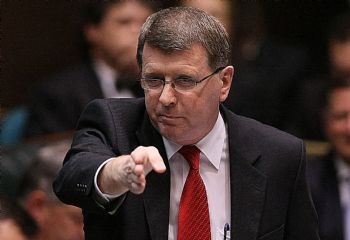
John Watkins MP
Right heavyweight Richard Amery was moved from Agriculture to Corrective Services portfolio and junior minister, Morris Lemma, had Sport and Recreation to his workload.16 Costa had come from obscurity to prominence with the support of Alan Jones, dating back to a charity dinner in April 2001 for the Neurological Institute for Schizophrenia and Allied Disorders (NISAD).

Michael Costa MP
Costa had been in Parliament for only 17 days when Carr chose him to replace Paul Whelan in the police ministry.17 Carr was asserting his authority but he was also reactive to bad publicity led by the media influence of Alan Jones. By April 2002, Costa had removed Police Commissioner Ryan18 and in doing so set a poor precedent of undermining the independence of the public service from the government of the day.
During 2002, the NSW Department of Community Services (DOCS) had been exposed in repeated controversy over maladministration of child protection, contributing to several tragic cases of child abuse. It too embarrassed the Carr Government.
Carr reacted to the media criticism by removing DOCS head, Carmel Niland, and shuffling Minister Fay Lo Po to the backbench. Carr replaced Lo Po with the younger Juvenile Justice Minister, Carmel Tebitt, again applying his government regeneration argument.
Carr is quoted as saying:
“It is always good in Government to freshen up with personnel, and just as Michael Costa and John Watkins have made a big difference by bringing new ideas and new approaches to education and police. So I think a young woman, Carmel Tebitt, will represent generational change in the Government as well. Useful generational change.” 19
In 2002, Carr’s Gaming and Racing Minister since 1995, Richard Face, was also set to be put out to pasture. A subsequent ICAC fine against him in 2004 revealed that Face had been under stress and depressed at the time of the 2003 election.20
In the lead up to the March 2003 election, Carr’s Minister for Fisheries and for Mineral Resources Edward (Eddie) Obeid MLC was the subject of controversy associated with what became known as the Oasis Affair21 , however, prompt investigation by the NSW Independent Commission Against Corruption (ICAC) found ‘no evidence that any donation was made to the ALP in relation to the project’ and…that ‘no findings were made that Mr Obeid ever solicited such a donation’.22
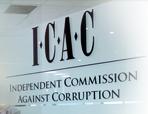
NSW Labor had gone into the March 2003 election as the incumbent government of two four year terms, ‘popular, cashed up and running on a track record of sound economic management’.40 Carr’s personal popularity had polled a 57% approval rating.
NSW Labor’s emphatic electoral win ‘was very much built around the presence of Bob Carr as leader.’41 The victory was reportedly mainly attributed Carr’s personal popularity in the electorate. But then Labor’s $10.7 million election advertising campaign had well exceeded that of the Coalition and the general indeed public mood was that the Coalition leader, John Brodgen, was considered too young, inexperienced and unknown to contend the Premiership.

John Brogden MP
External factors were also at the time pre-occupying the NSW media- most notably the US war in Iraq, unfolding on nightly television screens.
Yet, NSW Labor’s win firmly entublicly denounced as a "demon" and a "mongrel bureaucrat" by radio announcer Alan Jones.27
.jpg)
Carl Scully MP
Scully himself eventually became the target of the Opposition and the media and so a weak point in Carr’s political armour.28 When Scully on 17th March 2003 (days before the election) released the Government's transport policy without public support of the Premier Bob Carr, it was read in the media and Opposition that Scully had become a liability for Mr Carr's campaign and would be stripped of the Transport portfolio after the poll.29 Scully’s embarrassment of the Carr Government would later contribute to Scully’s failed bid to succeed Carr. A week after the election, Carr handed Costa Transport and a week hence Deegan was ‘removed privately’ on the basis that Costa had “decided to restructure transport and Deegan was simply surplus to requirements”.30
4.3 Carr purges public service failings
In 1995 when Carr had entered his Premiership, he had inherited the Greiner Liberal Government’s fixed-term contract system of the public service, adopting the United States model. The Public Service Board had been abolished some years prior in 1989. The combined result was that senior departmental executives had become more accountable to ministers for their performance. The authority to appoint and terminate chief executive officers now rested with ministers, so ministers now held greater influence down the chain of command. On the other side of the coin, the independence of the public service from government of the day was seen to be undermined.
As journalist Quentin Dempster noted that by 2003 after eight years of incumbency, Carr had promoted ‘a cult of personality around him, something of a Medici court has developed with its own backbiting, rivalry and competition for access and inside influence...the days of “frank and fearless” independent advice to government were over’.31 Public-sector management in NSW had become politicized. If a minister was not comfortable with the department or agency head, that head could roll.
After police deputy commissioner Jeff Jarratt was sacked in September 200132 while Paul Whelan was Carr’s Police Commissioner, Jarratt successfully won a High Court ruling that his summary dismissal had been unlawful, The Chief Justice, Murray Gleeson, had said the notion of public servants holding office only at the pleasure of the Crown was "difficult to reconcile with modern concepts of government employment and accountability".33 But Carr immediately amended the Public Sector Employment and Management Act to allow executives to be removed at any time without reason, regardless of performance-appraisal procedures. This measure was described as “Bob Carr’s off-with-their-heads clause”.34
As soon as Carr appointed Michael Costa as Transport Minister on 2nd April 2003, three senior bureaucrats were purged. Michael Deegan, Director-General of the Transport Department and Coordinator-General of Rail was sacked and with Costa’s announced restructure, Howard Lacy, Chief Executive of State Rail and John Cowling of the Rail Infrastructure Corporation were out.35 They had embarrassed the Carr Government over issues of public transport safety and were seen as scapegoats of the failings of Carr’s previous Transport Minister Carl Scully, but Scully was moved sideways into the Housing portfolio.
As soon as Carr expanded John Della Bosca’s ministerial portfolio to Della Bosca's ministerial responsibilities to include Commerce, Finance, Industrial Relations, Ageing and Disability Services, Director-General of Public Works and Services, and Chair of the Australian Procurement and Construction Ministerial Council, Dick Persson, was out.
By November 2005, Labor’s public service purging was rampant as Crikey36 then list of senior scalps reveals:
• Mal Hemmerling: sacked as CEO of SOCOG by Michael Knight in 1997.
• Ken Baxter: Bob Carr hired Jeff Kennett’s top bureaucrat when he won office in 1995 but then fired his departmental secretary in 1997.
• Energy Australia Board: Treasurer Michael Egan sacked all six board members of what was then Australia’s biggest electricity distributor in November 1997 but never really gave an adequate explanation.
• Helen Bauer: sacked in 1998 after just 15 months as head of the difficult Department of Community Services.
• Major General Horrie Howard: Director General State Emergency Service. “Retired” not long after the April 1999 hailstorms debacle but was given a couple of board positions.
• Kaye Loder: sacked by Bob Carr as chairwoman of the NSW Casino Control Authority in April 2000 after making comments on Four Corners suggesting she would prefer drug money went through the Sydney casino rather than interstate.
• Ron Bruce: sacked from his State Rail position in charge of the Tangara train project a few days after the Waterfall inquiry.
• Grahame Bush: stood down as chairman of the South Western Sydney Area Health Service over the Camden and Campbelltown hospital scandals.
• Jennifer Collins: sacked as general manager of the Camden and Campbelltown Hospitals but since exonerated by ICAC and now running an unfair dismissal action.
• Paul Forward: quit as CEO of the Roads and Traffic Authority last week after what Roads Minister Joe Tripodi called “a grave mistake” in not disclosing full details of the financial liabilities for taxpayers in the Cross City Tunnel contract.
• Robyn Henderson: sacked as head of the Deparment of Women whilst on holidays in Portugal.
• Howard Lacy: terminated as CEO of State Rail when Michael Costa became Transport Minister in 2003.
• Jan McClelland: sacked from the Department of Education and Training following Andrew Refshauge’s move from Planning.
• Jock Murray: sacked as director general of Transport under Carl Scully.
• Arthur Smith: former deputy CEO of State Rail was sacked a few days after the Waterfall inquiry.
• Bob Smith: Director general of the Department of Land & Water Conservation (DLWC) from 1995-96 and at the same time DG NSW State Forests, removed by then Minister in 2003 when department merged with Planning and there were some timber supply issues.
• Alex Walker: departed as CEO of Sydney Water in 2003. The Opposition claimed at the time he was “made to carry the can for the board and the government’s incompetence”.
• Ian Southwell: sacked as CEO of the South Western Sydney Area Health Service over the Camden and Campbelltown hospital scandals
• Brain Steffen: sacked as Director-General of the NSW Ministry of Energy and Utilities in February 2004 by Frank Sartor.
• Amanda Adrian: sacked as Health Care Complaints Commission by Health Minister Morris Iemma in 2004 after the inquiry into the Camben and Campbelltown hospitals.
and…
• Michael Deegan - DG, Dept of Transport
• Sue Holliday - DG, Dept of Planning
• Simon Lane - CEO, State Rail
• Dick Persson - DG, Public Works
• John Wynn - Owens Ex Director General, Health
• John Rogan - Ex Deputy Director General, Department of Transport
• John Brew Ex - Chief Executive, State Rail Authority ( before Simon Lane)
• John Stott - Ex Chief Executive, State Transit Authority
• Judi Stack - Ex Chief Executive, Rail Access Corporation
• Terry Ogg - Ex Director General, Rail Services Authority
• Paul Crombie - Ex Director General, Tourism
• Tony Thirlwell - Ex Director General, Tourism ( Crombie’s successor)
• Carol Davis - Ex Chief Executive, AntiDiscrimination
• Ken Cripps - Ex Deputy Director General, Premiers
• David Field - Ex Chairman of Sydney Ports Corporation
• Jane Diplock - Ex Director General, TAFE ( before Jan McCelland)
• Peter Cunningham - Ex Valuer General
• Gary Stainton - Ex General Manager, Business
• Bob Wilson - Ex General Manager, Sydney Water
• Tony Wright - Ex Deputy General Manager, Sydney Water
• Marianne Hammerton - Ex Director General DADHC
• Jane Wolfe - Ex Deputy Director General, Commerce. 37
Such purging revealed the desperate preparedness of the Carr Government to maintain a façade of accountability with the electorate by using ministerial power to scapegoat senior public service executives, instead of requiring ministers to accept responsibility for administrative failure. The scapegoating became rife and arguably institutionalised “as a tactic for short-term gain in media/public perception.”38
Carr’s personal penchant for journalism and media relations evolved into a hypersensitivity about his public image as Premier and his indirect monitoring of Sydney radio broadcaster Alan Jones is well documented. Carr’s autocratic message became clear throughout his Cabinet and right through the NSW public service - that those causing him public and media embarrassment would suffer the consequences. Carr’s autocratic management of the public service had become capricious.
Former NSW Auditor-General, Dr Louise Chappell, highlighted the systemic problems of Carr’s public service contract system of insecurity at senior levels and that it has encouraged public servants to pre-empt the political agenda of ministers rather than concentrate on strategic policy development.
Chappell critiqued the Carr Government’s public service purging:
“When government gets caught on issues management, it fails to recognise systemic policy problems and is unable to develop sound policy solutions. In such an environment, policy gets dumbed down – it becomes knee-jerk rather than a comprehensive, long-term and co-ordinated response to complex issues.” 39
Carr had become distracted by media image and the immediacy of public relations of issues of the moment, to the detriment of building effective long-term public policy and public infrastructure. But by now was Carr concerned with the long term for NSW or for NSW Labor?
4.4 Carr’s ‘generational change’ incites the Right Faction
.jpg)
Carr's Cabinet following the 2003 Election win
NSW Labor had gone into the March 2003 election as the incumbent government of two four year terms, ‘popular, cashed up and running on a track record of sound economic management’.40 Carr’s personal popularity had polled a 57% approval rating.
NSW Labor’s emphatic electoral win ‘was very much built around the presence of Bob Carr as leader.’41 The victory was reportedly mainly attributed Carr’s personal popularity in the electorate. But then Labor’s $10.7 million election advertising campaign had well exceeded that of the Coalition and the general indeed public mood was that the Coalition leader, John Brodgen, was considered too young, inexperienced and unknown to contend the Premiership.

John Brogden MP
External factors were also at the time pre-occupying the NSW media- most notably the US war in Iraq, unfolding on nightly television screens.
Yet, NSW Labor’s win firmly entrenched Carr’s leadership and his personal power and this handed Carr a sense of electoral mandate for a third four-year term to basically command, steer and reform the government completely on his own terms. It gave Carr electoral legitimacy to purge the poor performers, to purge particularly those who had embarrassed him in the campaign. Perhaps in Carr’s mind ‘embarrassment’ was not the term he would have used, but more a sense of failure of public service and ministers to live up to the high standards of public office. In any case, Carr as leader had borne the ultimate brunt of the media criticism over many failings of the NSW public service. Over many months of media scrutiny, Car would have felt frustrated that time and again the pubic service was failing the public and that senior bureaucrats were being hauled before the ICAC.
In Carr’s position as leader of the government and perhaps as is his prerogative, Carr felt a civil duty to right wrongs, fix the problems and remove incompetence. Carr identified the bad apples and purged. He also purged those who had dared to question his judgment or leadership. Carr was set to make his own new team and to the media he branded his purge strategy ‘injecting new blood and "generational change" into his cabinet.’42
But perhaps Carr’s justification for the purging and changes were not sold to the Party with the same energy and finesse as Carr had done publicly with the media. Was this a tactical oversight? It is likely the Party read, or misread the purging and changes not as in the noble interests of improving the standard of government, but instead as a self-centred outpouring of Carr’s autocratic scapegoating and his personal antagonism to those unsupportive of his political agenda.
By the 2003 election, Carr had for better or for worse created a divisive corrosive culture in NSW Labor – one was either loyally with Carr or vehemently against him. The problem for Carr was that his many purges and changes were regarded as Carr’s scapegoating and this only fueled the factional numbers against him.
After the 2003 election Carr instigated more organisational reforms. But this was to be nothing new from his previous and indeed ongoing ‘reforms’, largely attributed to bureaucratic departments and ministers embarrassing his credibility with the people of NSW and in turn exploited by influential anti-Labor media personalities. Carr after all had entered the Parliament during Neville Wran’s tenure as part of a process of regeneration. Government regeneration became a convenient argument for Carr to justify reshuffling his government, selecting the people of his choosing, as though a factional warlord in his own Right.
While Carr’s media oratory conveyed a sense of personal loyalty to the ordinary citizen, his decade in Opposition, characterised by battling internal party bickering and leadership manoeuvrings43 , left no love lost between Carr and Labor’s factions. People naturally tend to respond in kind to the way they are treated and factional bullying would not have been forgotten.
Immediately after the 2003 election win, true to form, the factional Right sought to reassert its influence. In the wake of what was regarded as Carr’s autocratic stamp of personal power, Carr’s branded ‘regeneration’, there were murmurings of a revolt against Carr, despite Carr’s personal popularity across the electorate being a key factor in Labor’s win.
The Right sub-faction known as the ‘Troglodytes’44 (or 'Trogs' for short) was led by Amery, who had recently embarrassed the Carr Government by poor performance of his Corrective Service portfolio.
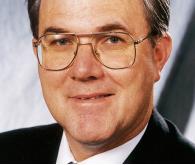
Richard Amery MP
Amery was supported by menagerie of disaffected MP's headed up by Obeid and Aquilina of the opposing Right ‘Terrigals’ subfaction, both whom has similarly embarrassed the Carr Government and attracted the ire of Carr.
A few days after the election, the three ‘Trogs’ instigated an internal revolt seeking to raise the numbers to challenge Carr’s leadership. The Trogs commanded 13 of the 19 cabinet positions and sought promotion of upper house, left-wing MLC Ian McDonald to the Cabinet.
Carr cancelled his scheduled trip to the Hunter region and reasserted his authority and immediately dumped Amery, Aquilina and Obeid from their Cabinet portfolios. By 27th March, just four days after the election, Carr had reshuffled his cabinet, effectively crushing the revolt and holding a media conference justifying the move as reasserted his pledge to inject new blood and "generational change" into his cabinet.45 Later that day Obeid released a statement confirming that he was standing aside from the frontbench ‘reluctantly’ hopeful of still having a significant role in the Carr Government's third term.46
Scully’s embarrassment of Carr’s Government saw him demoted from Transport to Roads and Housing. Carr added Transport to Costa’s super-portfolio and that afternoon Transport director-general, Michael Deegan, who had been the butt of attacks of incompetence from Alan Jones, had been ‘removed privately’. Then went Howard Lacy, Chief Executive of State Rail and John Cowling of the Rail Infrastructure Corporation.47 Also ousted in Carr’s purge were Head of Planning NSW, Sue Holliday; the Public Works chief, Dick Person; and Bob Smith, head of the soon to be disbanded Department of Land and Water Conservation and State Forests. 48
Craig Knowles was appointed the new Minister for Infrastructure Planning and Natural Resources. 
Craig Knowles MP
John Watkins was moved from education to police. Carr’s Deputy Andrew Refshauge moved from planning to education.
Carr’s purging had not only diffused the Right’s revolt, it was hell bent on removing the non-performers and those who had embarrassed the electoral credibility of Carr’s Government. Many functions of government were chopped and changed, further purging of top bureaucrats continued. Of Carr’s original 1995 Cabinet, only six members remained.49 One insider likened the election aftermath:
“like there'd been a change of government..all of a sudden everything was up for grabs."50
Carr restructured his cabinet with younger ambitious supporters and since there weren’t enough around, Carr created new super-portfolios. Frank Sartor assumed the super portfolio of Energy and Water Utilities, Health (Cancer) and Science and Medical Research. Della Bosca assumed Commerce, Finance, Industrial Relations, Ageing and Disability Services.
'A ruthlessly powerful group of political hardheads now surround Carr – Michael Costa, John Della Bosca, Michael Egan and Craig Knowles, with Labor Party secretary Eric Roozendaal aboard.’51
Carr described his political tactic as one of conciliation that would become "the template for driving change".52 Carr’s reforms of the public service and his cabinet reshuffle have been critised as:
‘more designed to fit ministers’ personalities and power preferences, media agendas than coherence in governance, policy formulation or operational management.’ 53
Clearly, as an act of political survival in the circumstances of internal revolt Carr had had to quickly assert his authority and the most effective way was to purge the power of the protagonists. It must have been quite Shakespearian. At this point, the threat of mutiny had obviously tested Carr’s stoic patience his and McKellian compromising approach to reform. But Carr didn’t stop there. Trust was critical and with the higher probability of personal loyalty to be found in new blood, Carr maintained the momentum of radical change bringing in his new blood before the enemy could regroup.
But in doing so is purging and radical change also would seed angst and division within the Party.
Carr’s purge of departmental heads executed by his new recruits was seen by many factional discontents as political interference in the independence of the NSW public sector and concerns that this interference had been influenced by the media. The rules were changing according to the political players in power.
‘Carr’s ‘reforms’ were considered by many in NSW Labor, both Left and Right as Carr cronyism “the promotion of a cult of personality around him, something of a Medici court has developed with its own backbiting, rivalry and competition for access and inside influence. The independence of department heads from ministers was seen as compromised. If a minister was not ‘comfortable’ with the department or agency head, that head could roll. ‘Ministerial satisfaction’ became the new imperative and the public service was considered to have become politicized.’’ 54
Buoyant from a fresh sense of authority from winning the 2003 election, Carr had secured his popularity with the people and commanded what he must have felt as a personal electoral mandate. But Carr’s personal popularity with the people had been achieved at the expense of many in his government. Carr’s purges had made him irreconcilably unpopular within the Labor Party and throughout the government. Loyalty to Carr survived within his small select Cabinet clique of favourites, outside of which Carr’s alienation had sown the seeds of factional vengeance.
[Author’s note: Without being privy to the internal goings on, one can only gleam the reasons for the purge and the vengeance that followed from publicised accounts. Likely more personal issues were critical contributors to Carr acting as radically he did in the aftermath of the March 2003 election. No doubt it was a time of acute power struggle.]
[Next Chapter ] [Previous Chapter ]
References
[1] Shelly Savage, 29th July 2005, ‘Bob Carr, erudite and urbane?’, http://www.onlineo??, ABC Radio ‘PM’programme, http://www.abc.net.au/pm/stories/s420125.htm
[2] http://en.wikipedia.org/wiki/Bob_Carr
[3] Marilyn Dodkin, May 2003, ‘Bob Carr: the Reluctant Leader’(biography), UNSW Press, https://www.unswpress.com.au/isbn/0868407577.htm
[4] http://yourordinaryday.blogspot.com/2009/06/positive-mental-attitude-of-abraham.html#axzz0rFsjUeTs
[5] http://www.nps.gov/liho/historyculture/legacy.htm
[6] Tim Soutphommasane, University of Oxford,19 December 2005, ‘Bob Carr: Ethos was more important than ideology’, Australian Review of Public Affairs, http://www.australianreview.net/digest/2005/12/soutphommasane.html
[7] Tim Soutphommasane, loc. cit.
[8] Tony Harris, Ex NSW Auditor, ‘Clever Carr', Australian Financial Review, p82,
http://www.sydneyalternativemedia.com/id100.html
[9] ABC Online, ‘Carr's green credentials under fire’, Monday, 15th November 2004,
http://www.abc.net.au/news/newsitems/200411/s1244099.htm
[10] Tony Stephens, 15th December 2001, ‘Mild with Excitement’, Sydney Morning Herald.
[11] David Penberthy, ‘Carr’s out of control spin, Police, transport cost $1 million(a year)’, 17th July 2000, Daily Telegraph, p. 12 http://www.sydneyalternativemedia.com/id100.html
[12] http://en.wikipedia.org/wiki/John_Aquilina#cite_note-1
[13] http://www.smh.com.au/articles/2002/08/02/1028157844696.html
[14] Toni Hassen (reporter), Monday 19th November 2001, ‘NSW Labor Party on verge of reshuffle’, ABC Radio ‘PM’programme, http://www.abc.net.au/pm/stories/s420125.htm
[15] Toni Hassen, loc.cit
[16] ABC, ‘New NSW Police Minister vows to make changes’, Wednesday, 21st November 2001, http://www.abc.net.au/news/newsitems/200111/s422174.htm
[17] http://www.smh.com.au/articles/2002/08/02/1028157844696.html
[18] Quentin Dempster, (reporter), 10th April 2002, ‘Ryan quits as NSW top cop’, ABC 7:30 Report programme, http://www.abc.net.au/7.30/content/2002/s528362.htm
[19] Peta Donald (reporter), ‘Carr reshuffle to push DOCS off front page’, ABC Radio ‘PM’ programme, Thursday 11th July 2002, http://www.abc.net.au/pm/stories/s604698.htm
[20] Geesche Jacobsen and Natasha Wallace, 24th December 2004, ‘Career switch saves Face from prison’, Sydney Morning Herald, http://www.smh.com.au/news/National/Career-switch-saves-Face-from-prison/2004/12/23/1103391900347.html
[21] John Stewart, ‘NSW Govt tries to escape Oasis controversy’, 30th August 2002, ABC Radio National ‘PM’ programme, http://www.abc.net.au/pm/stories/s663395.htm
[22] NSW Independent Commission Against Corruption, 27th February 2003, ‘Report on investigation into conduct concerning the Woodward Park project’, p.2
[23] http://www.independent-nsw.com/obeid.html
[24] Quentin Dempster, 14th February 2003, ‘The "revolving door" syndrome in our prisons’. ABC TV Stateline programme, http://www.abc.net.au/stateli??, ABC Radio ‘PM’programme, http://www.abc.net.au/pm/stories/s420125.htm
[25] http://en.wikipedia.org/wiki/Glenbrook_rail_accident
[26] http://en.wikipedia.org/wiki/Waterfall_rail_accident
[27] http://www.griffithreview.com/edition-3/116-reportage/490.html
[28] Peter van Onselen, School of Politics and International Relations, University of New South Wales, Refereed paper presented to the Australasian Political Studies Association Conference, University of Tasmania, Hobart, 29 September – 1 October 2003, p.1, http://www.utas.edu.au/government/APSA/PvanOnselenNSWelectionfinal.pdf
[29] http://www.abc.net.au/news/newsitems/200303/s809299.htm
[30] http://www.griffithreview.com/edition-3/116-reportage/490.html
[31] Quentin Dempster, 2nd February 2005, ‘Media rules in the court of Carr’, Griffith University, http://www.griffithreview.com/images/stories/edition_articles/ed3_pdfs/dempstered3.pdf
[32] Michael Vincent (reporter), ‘Deputy Police Commissioner sacked’, 6th September 2001, ABC Radio ‘AM’ programme, http://www.abc.net.au/am/stories/s359659.htm
[33] Michael Pelly (Legal Reporter), ‘Sacking of deputy chief unfair, says High Court’, 9th September 2005, Sydney Moring Herald, http://www.smh.com.au/news/national/sacking-of-deputy-chief-unfair-says-high-court/2005/09/08/1125772641079.html?from=moreStories
[34] Quentin Dempster, 2nd February 2005, loc. cit.
[35] Quentin Dempster, ‘The Alan Jones factor?’, 11th April 2003, ABC ‘Stateline NSW’ programme, http://www.abc.net.au/stateline/nsw/content/2003/s829811.htm
[36] Stephen Mayne, ‘The huge list of fired NSW bureaucrats’, 2nd November 2005
Crikey, http://www.crikey.com.au/2005/11/02/the-huge-list-of-fired-nsw-bureaucrats/
[37] Andrew Williamson, ‘Sacked NSW public servants’, 6th November 2005, Crikey, http://www.crikey.com.au/2005/11/06/sacked-nsw-public-servants-for-tuesday/
[38] Quentin Dempster, 2nd February 2005, loc. cit
[39] Quentin Dempster, 2nd February 2005, loc. cit
[40] Peter van Onselen, loc. cit.
[41] Peter van Onselen, loc. cit.
[42] http://www.smh.com.au/articles/2003/03/26/1048653746331.html
[43] https://www.unswpress.com.au/isbn/0868407577.htm
[44] http://www.pollbludger.com/nsw2007/mountdruitt.htm
[45] Robert Wainwright and Paola Totaro, 27th March 2003, http://www.smh.com.au/articles/2003/03/26/1048653746331.html
[46] Sydney Moring Herald, ‘NSW minister opts out of new Carr cabinet’, 27th March 2003,
http://abc.gov.au/news/stories/2003/03/27/817411.htm
[47] Quentin Dempster, 11th April 2003, ‘The Alan Jones factor?’, ABC TV ‘Stateline’ programme, http://www.abc.net.au/stateline/nsw/content/2003/s829811.htm
[48] Paola Totaro and Joseph Kerr, 3rd April 2003,’Carr's poppy-lopping cabinet’, http://www.smh.com.au/articles/2003/04/02/1048962820401.html
[49] ABC News, ‘Carr defends female representation in Cabinet’, 2nd April 2003, http://www.abc.net.au/news/stories/2003/04/02/822647.htm
[50] Quentin Dempster, 2nd February 2005, loc. cit.
[51] Peter van Onselen, loc. cit.
[52] Quentin Dempster, 2nd February 2005, loc. cit.
[53] Quentin Dempster, 2nd February 2005, loc. cit.
[54] Quentin Dempster, 2nd February 2005, loc. cit.
[online material accessed up to 17th June 2010]


.jpg)
.jpg)









.jpg)
.jpg)

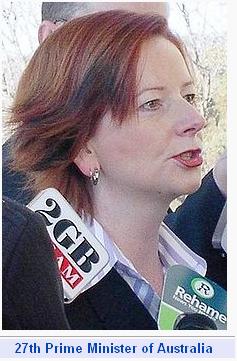 Now that people have finally accepted that gender is and should be irrelevant in politics (at least in civilised societies like Australia) we can get down to the agenda and actions of Acting PM Gillard's new leadership team.
Now that people have finally accepted that gender is and should be irrelevant in politics (at least in civilised societies like Australia) we can get down to the agenda and actions of Acting PM Gillard's new leadership team.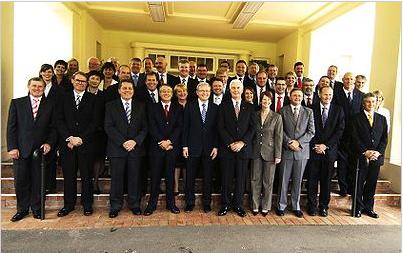

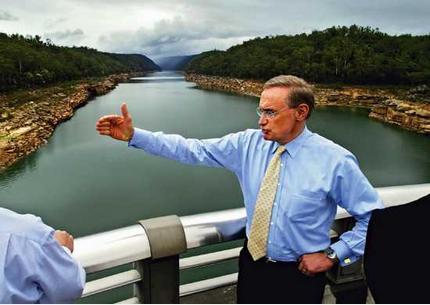
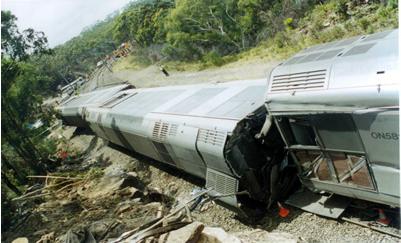

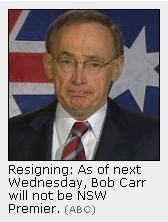
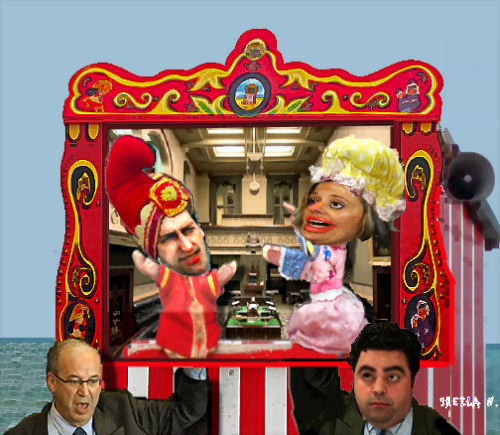


Recent comments